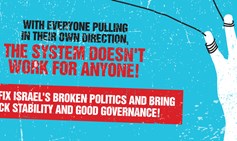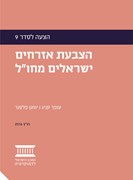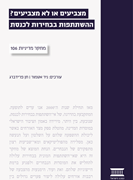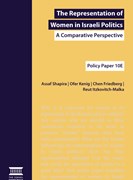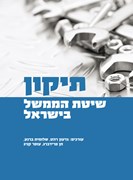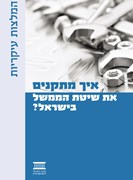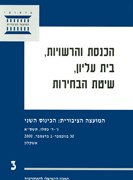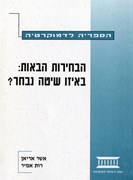

Publications Regarding electoral systems
Articles

Could Sderot Have the Same Standing as Tel Aviv? Perhaps If We Reform the Electoral System
Written By: Dr. Assaf Shapira, Prof. Gideon Rahat
Israel is the only OECD member that has neither regional elections nor a personal element in the electoral system. This is not simply a technical issue but has far-reaching implications relating to the quality of representation and the obligation elected officials have toward their voters.
Fixing the System: A New Look
Written By: Prof. Gideon Rahat
The current political instability is the result a breach of accepted rules of the game that are based on assumptions about the nature of politics—and even of human nature.
Is Third Time a Charm?
Written By: Prof. Ofer Kenig
Israel is gearing up for its third national elections in less than a year - how does this compare to other democracies around the world?
Benjamin Netanyahu Fails to Form a Government – What Happens Next?
Written By: Yohanan Plesner
While we cannot know for sure if Benny Gantz will succeed where Benjamin Netanyahu has failed, we can state with certainty that our political system of the past year has been characterized by deadlock, and this is not expected to end in the near future.
Majority of Israelis Think Netanyahu Should Resign
After Netanyahu returns mandate to the President: Most Israelis support a system based on 2 large parties and a Netanyahu-Gantz rotation for the position of prime minister. 53.5% of Israelis think Netanyahu should resign immediately, while almost half (47%) of right-wing voters believe that Netanyahu should resign if indicted.
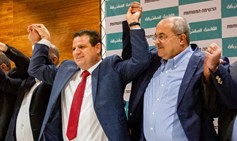
Every Cloud has a Silver Lining?
Written By: Dr. Arik Rudnitzky
Arab parties can surge if they shake off the old politics - a significant number of Arabs who stayed home in April will vote if they are persuaded their leaders have integrity

The Absurdity of Campaign Financing in Israel
Written By: Dr. Assaf Shapira
Why should parties be allowed to use state funding for ongoing expenses to cover the debts accrued during political campaigns?

Give Credit to the Most Democratic Party in Israel
Written By: Prof. Gideon Rahat, Prof. Ofer Kenig
Long ridiculed, Labor is one of the few parties that meet stringent standards on campaign finance and transparency

For These Do-Over Elections, We are all Smarter
Written By: Prof. Amichai Cohen
Another Election? It Has its Pluses for the Public and for Democracy. Voters got to see how parties behaved after elections, and parties now know the real risk of a hardline negotiation stance.
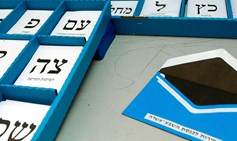
Israel Should Adopt Open-Primaries System on Election Day
The Israel Democracy Institute, the Kohelet Forum, Israel 2050, The National Union of Israeli Students, and the Israel Leadership Forum have joined together to call for the implementation of a "primaries on Election Day" system in Israel. This approach is often referred to among academics as the "semi-open ballot"

Time to Reform the Electoral Process
Written By: Prof. Gideon Rahat
What reforms are necessary to repair the electoral process to improve governance? Prof. Gideon Rahat sits down to discuss the upcoming elections with David Schulberg from the Israel Connexion in Australia
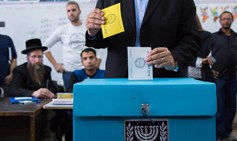
Israeli Politics Fractured: The System Needs Fixing
Written By: Prof. Gideon Rahat
It is commonly accepted that in order to defeat Netanyahu, the political parties in the center and on the Left must unite and present a single and clear alternative. However, under the current system, this claim is simply not true.
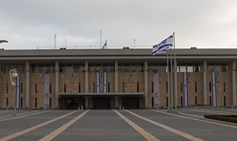
Multi-Party System in Israeli Politics
Written By: Prof. Gideon Rahat
How will yesterday's announcement impact the elections? Will Bennet and Shaked take votes from the right and will their gamble pay off? Listen to Prof. Gideon Rahat talk to The Israel Project on the fragmentation of the Israeli political system.
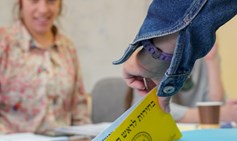
Local Government and Local Elections: Time to Move Away from Centralized Thinking
Written By: Prof. Gideon Rahat
Israel’s system of local elections has been in place since the 1970s - but is it optimal? Prof. Gideon Rahat proposes reform to enhance the compatibility of the system to the characteristics and needs of different localities.
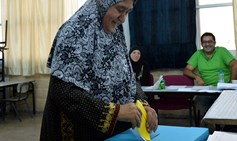
Why Local Elections Matter
Written By: Yohanan Plesner
"While Israeli national politics get most of the coverage, it is the local level that in many cases has the greatest impact on Israeli lives." Read Yohanan Plesner's op-ed on the upcoming municipal elections and why electoral reform is required, both on the local and national level.
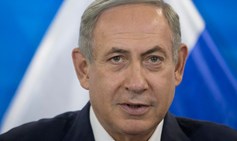
New Record! Netanyahu Now Longest Continuously Serving Israeli Prime Minister
Written By: Prof. Ofer Kenig
As of November 22, 2016, Benjamin Netanyahu will have occupied the Prime Minister’s Office for 2,793 days in a row, thereby surpassing David Ben-Gurion for the longest continuous tenure as premier in Israeli history.

America: Land of Endless Voting Opportunities?
Written By: Prof. Ofer Kenig
Dr. Ofer Kenig discusses the multiple ways in which the United States has facilitated the voting process in order to improve voter turnout, and suggests that Israel adopt a number of these innovations. This op-ed originally appeared in the Jerusalem Post.
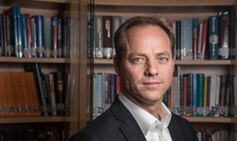
No Way to Run a Democracy
Written By: Yohanan Plesner
IDI President Yohanan Plesner argues that electoral reform will not suffice to fix the short-term-ism that is destroying Israel's capacity for long-term planning and policy execution; reform of the internal processes of the parties themselves is required. This op-ed first appeared in the Jerusalem Report.

Should Israel Lower the Voting Age to 17?
On March 20, the Ministerial Committee on Legislation will discuss legislation calling to lower the voting age in Israel from 18 to 17. Dr. Ofer Kenig, a researcher in IDI's Political Reform project, explains the the implications.

The Israel Democracy Institute is Opposed to Expanding the Criteria for Disqualifying Knesset Candidates
Ahead of Sunday's vote on an 'Arab exclusion' bill by Yisrael Beiteinu Minister of Knesset Oded Forer, IDI's Prof. Mordechai Kremnitzer and Dr. Amir Fuchs sent a policy statement to the committee against the bill.

Israeli Democracy Institute to Ministers: Support the Amendment to the Propaganda for Elections Law
Policy statement: "The current law from 1959 does not jibe in the current media and political reality of the 21st century and causes discrimination between different forms of media and political forces."
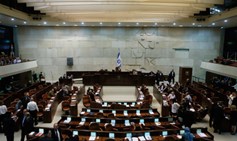
How to Prevent the Recurrence of Early Knesset Elections
Written By: Yohanan Plesner
IDI President Yohanan Plesner recommends a change of approach and some practical steps for changing the reality in which the Israeli public repeatedly goes to the polls to elect a new Knesset before the previous Knesset has finished its term.

Democracy: The Key Election Issue
Written By: Prof. Mordechai Kremnitzer
In an op-ed in Maariv, IDI Vice President Prof. Mordechai Kremnitzer calls for an election campaign that focuses not only on foreign policy and Israel's social gap, but on the nature of Israeli identity and the value of Israeli democracy itself.
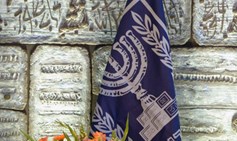
The Israeli Presidency: Unnecessary Institution or Vital Symbol?
Written By: Dr. Dana Blander
As the 2014 presidential election draws near, once again there have been calls to do away with the institution of the presidency. Is the President of Israel an unnecessary position or a vital symbol? IDI researcher Dr. Dana Blander analyzes the two sides of this question.

The Electoral Threshold: Why the Rush?
Written By: Prof. Ofer Kenig
In an op-ed in the Jerusalem Post, Dr. Ofer Kenig warns that while there is nothing wrong with a moderate increase in Israel's electoral threshold, increasing it from 2% to 3.25% in a single step is problematic.
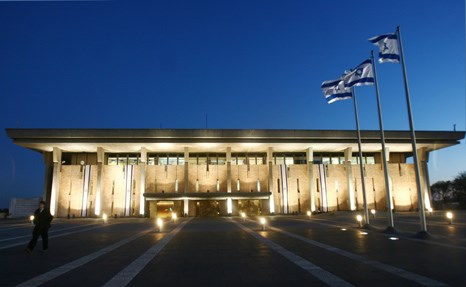
The Governance Bill: A Status Update
Written By: Prof. Gideon Rahat
An update on the status of the proposed Governance Bill and how it aligns with the recommendations of IDI researchers, which was written after IDI experts participated in Knesset committee deliberations.

Fixing our Broken System
Written By: Dr. Arye Carmon
The Israeli public is increasingly demanding a more effective system of government. In this op-ed from Israel Hayom (February 2, 2012), IDI Former President and Founder Dr. Arye Carmon asserts that reforming the system of government is the only answer to stabilizing the executive so that a party that has been voted into power can actually govern, and points to two types of necessary change: structural and perceptual.

Decade in Review: Israeli Governance in Crisis
Written By: Dr. Arye Carmon
IDI Former President and Founder Dr. Arye Carmon, one of Israel's foremost experts on political reform, sums up the Israeli political scene at the end of the first decade of the third millennium in an article that was published in collaboration with Walla!, a popular Israeli website.

IDI President Explores Israel's 'Silent Killer' and Calls for Political Reform
In an article by Dan Pine originally published in J.Weekly on November 5, 2009, IDI President Dr. Arye Carmon describes Israel's internal domestic developments as its greatest existential threats and stresses the urgent need for political reform.

Who Wins the Israeli Election? That Depends on How You Count the Votes
Written By: Naomi Himeyn Raisch
An analysis of the different patterns of alliances, unions, and mergers between political parties in Israel, which was originally published in Hebrew in IDI's online "Parliament" journal.

District Elections in Israel: Pro and Con
Written By: Nir Atmor
A broad survey of the various models of district elections that could be adopted in Israel, which includes a comparative international perspective and explores the factors that must be taken into consideration when deciding to adopt such a system in Israel.

Ultra-Orthodox Parties in Municipalities in Israel
Written By: Dr. Gilad Malach
Tomorrow's elections will determine the local government in 251 cities, towns and municipalities. Of all the political parties represented at a national level in Israel, the ultra-Orthodox parties are the most successful in local government. What are the reasons behind this interesting trend? Read Dr. Gilad Malach's fascinating findings.

